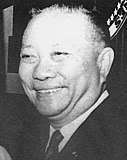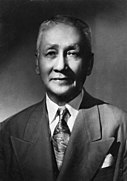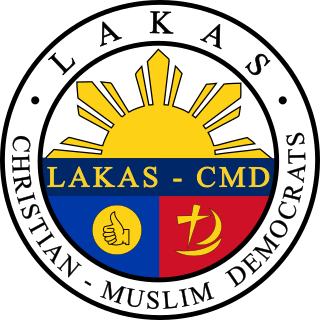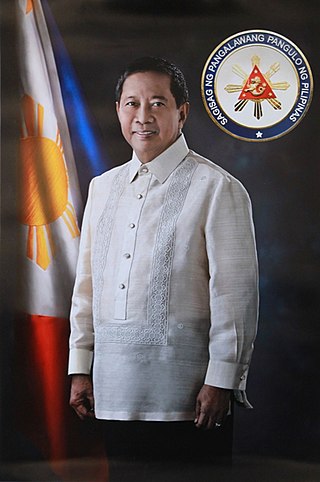
This is a list of the current and former vice presidents of the Philippines by time in office consisting of the 14 vice presidents in the history of the Philippines. The basis for this list is counted by the number of calendar days.

This is a list of the current and former vice presidents of the Philippines by time in office consisting of the 14 vice presidents in the history of the Philippines. The basis for this list is counted by the number of calendar days.


Updated daily according to UTC
| OTL | # | Vice-President | Length of term | |||
|---|---|---|---|---|---|---|
| 1 | 3 | Fernando Lopez | 4 years, 0 days | 10 years, 274 days | 1461 days | 3,926 days |
| 7 | 6 years, 274 days | 2465 days | ||||
| 2 | 1 | Sergio Osmeña | 8 years, 260 days | 3182 days | ||
| 3 | 8 | Salvador Laurel | 6 years, 126 days | 2317 days | ||
| 4 | 13 | Jejomar Binay | 6 years, 0 days | 2192 days | ||
| 5 | 9 | Joseph Estrada | 6 years, 0 days | 2191 days | ||
| 6 | 12 | Noli de Castro | 6 years, 0 days | 2191 days | ||
| 7 | 14 | Leni Robredo | 6 years, 0 days | 2191 days | ||
| 8 | 5 | Diosdado Macapagal | 4 years, 0 days | 1461 days | ||
| 9 | 6 | Emmanuel Pelaez | 4 years, 0 days | 1461 days | ||
| 10 | 11 | Teofisto Guingona Jr. | 3 years, 162 days | 1257 days | ||
| 11 | 4 | Carlos P. Garcia | 3 years, 78 days | 1174 days | ||
| 12 | 10 | Gloria Macapagal Arroyo | 2 years, 204 days | 935 days | ||
| 13 | 15 | Sara Duterte | Incumbent (6 years if term is completed) | 690 days | ||
| 14 | 2 | Elpidio Quirino | 1 year, 325 days | 690 days | ||

The president of the Philippines is the head of state, head of government and chief executive of the Philippines. The president leads the executive branch of the Philippine government and is the commander-in-chief of the Armed Forces of the Philippines.

The Senate of the Philippines is the upper house of Congress, the bicameral legislature of the Philippines with the House of Representatives as the lower house. The Senate is composed of 24 senators who are elected at-large under plurality-at-large voting.

Lakas–Christian Muslim Democrats, abbreviated as Lakas–CMD and popularly known as Lakas, was a political party in the Philippines. Its ideology and that of its successor is heavily influenced by Christian and Islamic democracy. The party's influence on Philippine society is very strong, especially after the People Power Revolution, which has led the country to elect two presidents from the party, namely Fidel V. Ramos, a United Methodist, and Gloria Macapagal Arroyo, a Roman Catholic.

The Nationalist People's Coalition (NPC) is a conservative political party in the Philippines which was founded in 1992 by presidential candidate Danding Cojuangco.
The governor-general of the Philippines was the title of the government executive during the colonial period of the Philippines, governed by Mexico City and Madrid (1565–1898) and the United States (1898–1946), and briefly by Great Britain (1762–1764) and Japan (1942–1945). They were also the representative of the executive of the ruling power.

The 2004 election of members to the Senate of the Philippines was the 28th election to the Senate of the Philippines. It was held on Monday, May 10, 2004, to elect 12 of the 24 seats in the Senate. The major coalitions that participated are the Koalisyon ng Katapatan at Karanasan sa Kinabukasan, composed of parties that support the candidacy of President Gloria Macapagal Arroyo, and the Koalisyon ng Nagkakaisang Pilipino, composed of parties that support the candidacy of film actor Fernando Poe Jr. coalition. The Alyansa ng Pag-asa was a minor coalition made up of Aksyon Demokratiko and Partido para sa Demokratikong Reporma–Lapiang Manggagawa. K4 won seven seats, while the KNP won the remaining five contested seats.

The Liberal Party of the Philippines abbreviated as the LP, is a liberal political party in the Philippines.

Carlos Polestico Garcia, often referred to by his initials CPG, was a Filipino teacher, poet, orator, lawyer, public official, political economist, guerrilla and Commonwealth military leader who was the eighth President of the Philippines. A lawyer by profession, Garcia entered politics when he became representative of Bohol’s 3rd district in the House of Representatives. He then served as a senator from 1945 to 1953. In 1953 he was the running mate of Ramon Magsaysay in the 1953 presidential election. He then served as vice president from 1953 to 1957. After the death of Magsaysay in March 1957, he succeeded to the presidency. He won a full term in the 1957 presidential election. He ran for a second full term as president in the 1961 presidential election and was defeated by Vice President Diosdado Macapagal.
Elections in the Philippines are of several types. The president, vice-president, and the senators are elected for a six-year term, while the members of the House of Representatives, governors, vice-governors, members of the Sangguniang Panlalawigan, mayors, vice-mayors, members of the Sangguniang Panlungsod/members of the Sangguniang Bayan, barangay officials, and the members of the Sangguniang Kabataan are elected to serve for a three-year term.

The Commission on Appointments is a constitutional body which confirms or rejects certain political appointments made by the President of the Philippines. The current commission was created by the 1987 Constitution.

The People's Reform Party (Philippines) (abbrev. PRP) is a political party in the Philippines. Founded on April 12, 1991, as the political party of former Agrarian Reform Secretary Miriam Defensor Santiago for her bid as president in the 1992 Presidential Elections. During the 1992 Elections, the party nominated Santiago as president and Ramon Magsaysay, Jr. as vice president, however both Santiago and Magsaysay lost the elections to former Defense Secretary Fidel Ramos and then-Senator Joseph Estrada, respectively. The Force of Reform Philippines (FORPH) serves as the official youth-wing of the People's Reform Party. While under the same Miriam Defensor Santiago wing, the Youth Reform Movement is not related to the PRP.

The vice president of the Philippines is the second-highest official in the executive branch of the Philippine government and is the first in the presidential line of succession. The vice president is directly elected by the citizens of the Philippines and is one of only two nationally elected executive officials, the other being the president.

The government of the Philippines has three interdependent branches: the legislative, executive, and judicial branches. The Philippines is governed as a unitary state under a presidential representative and democratic constitutional republic in which the president functions as both the head of state and the head of government of the country within a pluriform multi-party system.

Jejomar "Jojo" Cabauatan Binay Sr. is a Filipino lawyer and politician who served as the 13th vice president of the Philippines from 2010 to 2016, under President Benigno Aquino III.

Jose Marie Borja Viceral, known professionally as Vice Ganda, is a Filipino comedian, actor, host, singer and television personality. He is considered one of the most successful entertainers in Philippine show business, noted for his stand-up routines, usage of observational comedy, situational irony and sarcasm in pertaining to Filipino culture and human sexuality. He is a regular host on ABS-CBN's noontime variety show It's Showtime and has starred in four of the top 10 highest-grossing films in Philippine cinema.

Presidential elections, legislative and local elections were held in the Philippines on May 11, 1998. In the presidential election, Vice President Joseph Estrada won a six-year term as president by a landslide victory. In the vice-presidential race, Senator Gloria Macapagal Arroyo won a six-year term as vice president also by a landslide victory. This was the third election where both president and vice president came from different parties.

Maria Leonor "Leni" Robredo is a Filipino lawyer and politician who served as the 14th vice president of the Philippines from 2016 to 2022. She previously served as the representative of the 3rd district of Camarines Sur from 2013 to 2016.

The president of the United Nations Economic and Social Council is the presiding officer of that body.